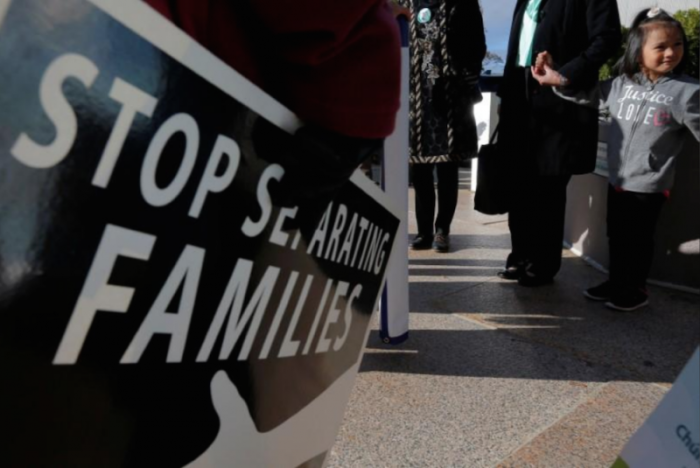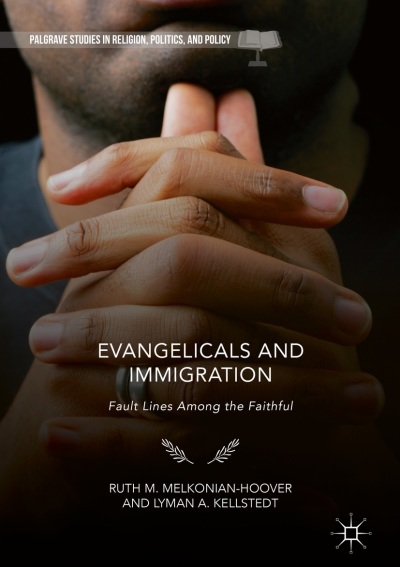White evangelicals support immigration more when active in church and theologically conservative

White evangelicals are some of President Donald Trump's strongest supporters and they tend to be the least supportive of immigration reform, but the white evangelicals who participate in church activities often and hold conservative evangelical beliefs are less Trump-like on immigration issues, according to recent research.
When controlling for other factors, frequent church attendance and evangelical beliefs are associated with greater support for immigration among white evangelicals, according to political scientists Ruth Melkonian-Hoover and Lyman Kellstedt.

Their findings appear in Evangelicals and Immigration: Fault Lines Among the Faithful (2018).
"Less evangelical" can mean "fewer evangelicals" but it can also mean "less devotion to evangelical beliefs," and this is where the multivariate analysis is helpful.
Since Trump's election, evangelicals have been thinking about, debating and reconsidering the question of "what is an evangelical?" Some of these discussions have been normative, addressing what an evangelical should believe.
Historians have looked at how the definition has changed over time. And social scientists, like Melkonian-Hoover and Kellstedt, have looked at measurement issues — how should "evangelical" be defined for opinion polls?
The thesis of Evangelicals and Immigration is that among evangelicals, immigration policy lies along three main fault lines — 1) the split between white evangelicals and nonwhite evangelicals, 2) the divide between evangelical leaders and evangelical laity, and 3) the differences among evangelical leaders themselves.
All three of these fault lines demonstrate that evangelical beliefs about immigration aren't easily defined, and that the immigration debate overlaps with the "what is evangelical?" debate. Why do many self-identified white evangelicals disagree with many evangelical leaders and their nonwhite co-religionists on immigration?
The effect was small. Political variables, such as presidential approval, were much better predictors of immigration attitudes. And overall, white evangelical churchgoers are more Trumpish on immigration. But church attendance was statistically significant when controlling for beliefs and other factors, and the direction of the influence flipped — the white evangelicals with conservative religious beliefs who are active in church are more likely to disagree with Trump on immigration.
"This combination of results is another nail in the coffin for the idea that high levels church attendance cause conservative policy positions. Instead, religious behavior seems to actually push in a liberalizing direction," Melkonian-Hoover and Kellstedt wrote.
The authors are themselves evangelical, and from evangelical institutions. Melkonian-Hoover is chair and professor of political science at Gordon College, Wenham, Massachusetts, and Kellstedt is emeritus professor of political science at Wheaton College, Wheaton, Illinois.
The religious belief measure included questions like whether the respondent believes in Heaven or Hell, and whether traditional beliefs should be defended rather than accommodated to modern mores. Besides church attendance, the religious participation measure also included questions about prayer, small group involvement, Bible reading and church membership.
The immigration question asked respondents whether the growing number of immigrants made the nation better or worse.
These results are consistent with others showing that those who identify as evangelical but don't appear to be active in a church tend to be more loyal Trump supporters. A September 2018 report by Emily Ekins, research fellow and director of polling for The Cato Institute, found that racist Trump supporters are less religious than nonracist Trump supporters.
As previously described by The Christian Post, "Twenty-six percent of nonreligious white Trump voters said their white identity was 'extremely important' to them, while only nine percent of religious white Trump voters answered the same. Only about half, 48 percent, of nonreligious Trump voters said they have warm feelings toward black people, while nearly three-in-four, 73 percent, of religious Trump voters said the same. Similar patterns emerged with attitudes toward Hispanics and Asians."
Melkonian-Hoover and Kellstedt's findings shouldn't be overstated, however, as there are still many devout, churchgoing, white evangelicals who support Trump's immigration policies. But it does point to some weakness in the hypothesis implied by some that a less evangelical nation would be less Trumpish. In its more offensive forms, some on the left even suggest that evangelicalism itself is inherently racist.
Another word of caution: Due to a scarcity of religious belief measures in large national sample polls, the authors had to rely upon a 2014 poll for some of their results, which was before Trump was elected. What they found, however, points to the need for more and better large sample national polls that do include religious belief measures.
As national debates over issues like border walls, Dreamers and asylum continue, Evangelicals and Immigration is a helpful text for anyone seeking to better understand the important role evangelicals play in these debates.




























